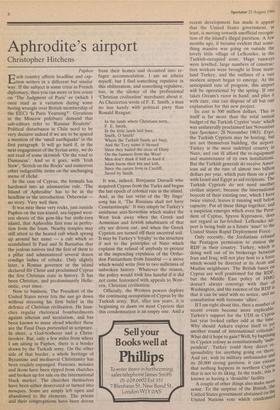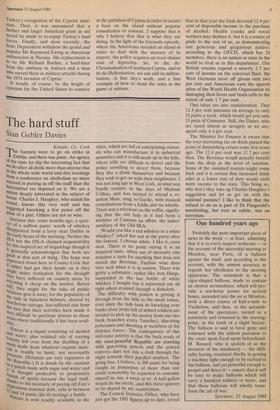Aphrodite's airport
Christopher Hitchens
Paphos
ach country affects headline and cap- tion writers in a different but similar way. If the subject is some crisis in French diplomacy, then you can more or less count on 'The Judgment of Paris' or (which I once read as a variation during some boring wrangle over British membership of the EEC) 'Is Paris Yearning?'. Gyrations in the Moscow politburo demand that sub-editors refer to 'Russian Roulette'. Political disturbance in Chile need to be very decisive indeed if we are to be spared a mention of the 'small earthquake' in the first paragraph. It will go hard if, in the next engagement of the Syrian army, we do not read of some skirmish 'On the road to Damascus'. And so it goes, with 'Irish Stew', 'Scotch on the Rocks' and numerous other indigestible items on the unchanging menu of cliché.
In the case of Cyprus, the formula has hardened into an adamantine rule. 'The Island of Aphrodite' has to be in the headline or the introduction. Otherwise no story. Very well then.
It was near these very rocks, just outside Paphos on the sun-kissed, sea-lapped west- ern shores of this gem-like but strife-torn island, that Aphrodite first rose in perfec- tion from the foam. Nearby temples may still attest to the heated cult which sprang up around her name — a cult which so scandalised St Paul and St Barnabas that the jealous natives tied the first of them to a pillar and administered several dozen condign lashes of rebuke. Only slightly later, a Roman governor or the island declared fOr Christ and proclaimed Cyprus the first Christian state in history. It has been Christian, and predominantly Helle- nistic, ever since.
Now to business. The President of the United States never lets the sun go down without stressing his firm belief in the defence of Christian civilisation. He laun- ches regular rhetorical bombardments against atheism and secularism, and has been known to muse aloud whether these are the Final Days portended in scripture. In short, a God-botherer and a Christ- invoker. But, only a few miles from where I am sitting in Paphos, there is a border drawn by the Turkish army. On the other side of that border, a whole heritage of Byzantine and mediaeval Christianity has been crudely expunged. Frescoes, mosaics and ikons have been ripped from churches and broken up for sale on the international black market. The churches themselves have been either desecrated or turned into mosques. Some are simply left open and abandoned to the elements. The priests and their congregations have been driven from their homes and decanted into re- fugee accommodation. I am an atheist myself, but I find something repulsive in this obliteration, and something repulsive, too, in the silence of the professional 'Christian civilisation' merchants about it. As Chesterton wrote of F. E. Smith, a man no less handy with political piety than Ronald Reagan:
In the lands where Christians were, F. E. Smith, In the little lands laid bare, Smith, 0 Smith!
Where the Turkish bands are busy, And the Tory name is blessed Since they hailed the cross of Dizzy On the banners from the West! Men don't think if half so hard if Islam burns their kin and kith, Since the curate lives in Cardiff, Saved by Smith.
It was, indeed, Benjamin Disraeli who acquired Cyprus from the Turks and began the last epoch of colonial rule in the island. And, as the last verse of the `By Jingo' song has it, 'The Russians shall not have Constantinople'. It may simply be Turkey's assiduous anti-Sovietism which makes the West look away when the Greek and Armenian and Jewish inhabitants of that city are driven out, and when the Greek Cypriots are turned off their ancestral soil. It may be Turkey's 'loyalty' to the structure if not to the principles of Nato which explains the refusal of anybody to protest at the impending expulsion of the Ortho- dox Patriarchate from Istanbul — a move which would write finis to two millennia of unbroken history. Whatever the reason, the policy would look less hateful if it did not come festooned with appeals to West- ern, Christian civilisation.
Officially, the Western powers deplore the continuing occupation of Cyprus by the Turkish army. But, after ten years, it is beginning to dawn on most Cypriots that this condemnation is an empty one. And a
recent development has made it appear that the United States government, at least, is moving towards unofficial recogni- tion of the island's illegal partition. A few months ago, it became evident that some- thing massive was going on outside the lovely little village of Lefkoniko, in the Turkish-occupied zone. Huge runways were levelled, large numbers of construc- tion workers were brought in from main- land Turkey, and the outlines of a vast modern airport began to emerge. At the anticipated rate of progress, this airport will be operational by the spring. If one takes Occam's razor in hand, and plies it with care, one can dispose of all but one explanation for this new project.
Its cost is 500 million dollars. This in itself is far more than the total annual budget of the Turkish Cypriot 'state' which was unilaterally proclaimed last November (see Spectator, 26 November 1983). Ergo, the Turkish Cypriots may be hosting, but are not themselves building, the airport. Turkey is the most indebted country in Nato, and can ill afford the re-equipment and maintenance of its own installations. But the Turkish generals do receive Amer- ican aid at the rate of almost two billion dollars per year, which puts them on a par with Israel and Egypt as aid recipients. The Turkish Cypriots do not need another civilian airport, because the international boycott of their existing one, which I have twice visited, leaves it running well below capacity. Put all these things together, and a suspicion emerges which even the Presi- dent of Cyprus, Spyros Kyprianou, does not regard as far-fetched. Lefkoniko air port is being built as a future 'asset' to the United States Rapid Deployment Force. Only recently, the Jordanians refused the Pentagon permission to station the RDF in their country. Turkey, which Is doing well out of its brokerage between Iran and Iraq, will not play host to a force which would be directed at its Arab and Muslim neighbours. The British bases on Cyprus are well positioned for the RIO, but the Middle East policy of HMG doesn't always converge with that of Washington, and the essence of the RDF Is that it can be used with no notice, and no consultation with tiresome 'allies'. If I am right about this, then a number of recent events become more explicable. Turkey's support for the UDI in Cyprus last year looked rather odd at the time Why should Ankara expose itself to Yet another round of international criticism? What did it hope to gain? Well, by baptising its Cypriot colony as constitutionally inde- pendent'. Turkey could deny direct re- sponsibility for anything going on there; And yet, with its military ambassador and its 20,000 strong garrison, it can ensure that nothing happens in northern Cyprus
i that is not to its liking. In the trade, this s known as having a 'deniable' facility.
A couple of other things also make more sense. To the surprise of the British, the United States government abstained on tnc, United Nations vote which condemned
Turkey's recognition of the Cypriot mini- state. Then, it was announced that a further and larger American grant in aid would be made to re-equip Turkey's land forces. Finally, and most recently, the State Department withdrew the genial and Popular Mr Raymond Ewing as American ambassador in Nicosia. His replacement is to be Mr Richard Boehm, a hard-liner from the embassy in Ankara and a man Who served there as military attache during the 1974 invasion of Cyprus. It would, of course, be the height of CYnicism for the United States to connive at the partition of Cyprus in order to secure a base on the island without popular consultation or consent. I suppose that is why I believe that that is what they are doing. In the light of the Grenada episode, where the Americans invaded an island in order to deal with the menace of its airport, the policy acquires an even shinier coat of hypocrisy. So, to the de- Christianisation of northern Cyprus, and to its de-Hellenisation, we can add its militar- isation. A fine day's work, and a fine example of how to bend the rules in the game of nations.







































 Previous page
Previous page